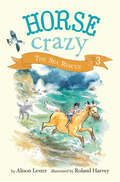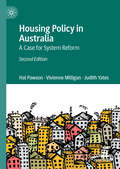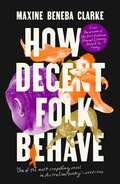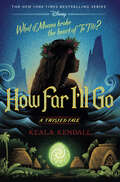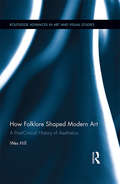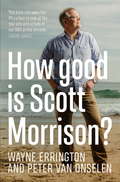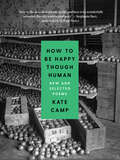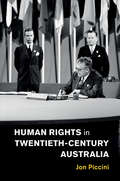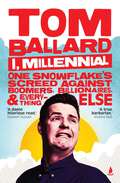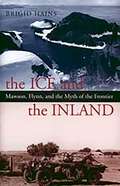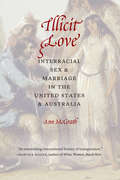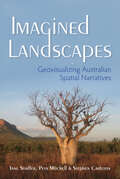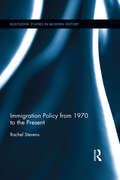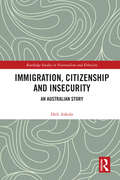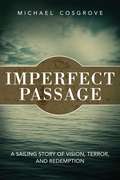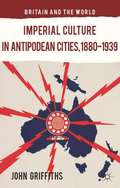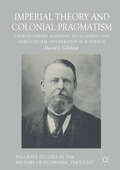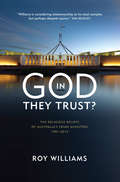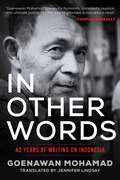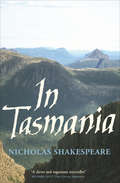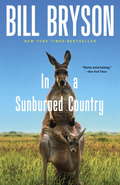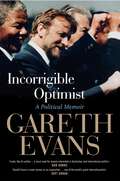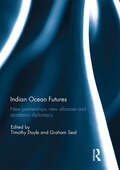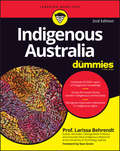- Table View
- List View
Horse Crazy: The Sea Rescue
by Len VlahosDuring summer vacation at Whale Bay, Bonnie and Sam are charged with shearing sheep and taking care of two horses, Tex, who is afraid of the ocean, and Blondie. Along the way, they stumble across clues to a mystery at Skull Rock. Kids won't be able to resist this page-turner as Bonnie and Sam put together the clues and catch the abalone poachers!
Housing Policy in Australia: A Case for System Reform
by Judith Yates Hal Pawson Vivienne MilliganThis book, extensively revised and updated in its second edition, presents a comprehensive overview of housing policy in Australia over the last quarter century. At a time of widespread concern about declining housing system performance, it investigates the many dimensions of housing affordability and housing wealth inequality, together with government actions affecting these outcomes. The authors analyse the causes and implications of falling home ownership, rising rental stress rates and the long-term neglect of social housing, as well as the housing situation of Indigenous Australians. Building on its analysis of housing policy evolution in modern Australia, this new edition also documents and critiques the numerous government efforts of the early 2020s to halt the decline in housing affordability. These reforms span tenancy regulation, land-use planning and housing supply, first home buyer assistance, and social/affordable housing investment. Throughout, the book identifies current and future housing challenges for Australian governments, recognising these as a complex set of inter-connected problems. Drawing on its coverage of the economics, politics and governance of housing provision, the final chapter outlines a pathway to the transformational national strategy needed for a fairer and more productive housing system.
How Australia Decides
by Sally YoungIn recent years, the Australian media have come under fire for their reporting of politics and election campaigns. Political reporting is said to be too influenced by commercial concerns, too obsessed with gossip and scandal, and too focused on trivia and 'sound bites' at the expense of serious issues. There are accusations of bias, sensationalism, 'lazy' journalism and 'horse-race' reporting that is obsessed with opinion polls. How Australia Decides is the first book to put these allegations to the test. Based on a four-year empirical study, Sally Young reports the results of the only systematic, historical and in-depth analysis of Australian election reporting. This groundbreaking book shows how election reporting has changed over time, and how political news audiences, news production and shifts in political campaigning are influencing media content, Ai with profound implications for Australian democracy.
How Decent Folk Behave
by Maxine Beneba Clarkewe are all just one small disasteraway from sinking, and sometimes you only realisewhen you're gasping for airOn a daylight street in Minneapolis Minnesota, a Black man is asphyxiated - by callous knee of an officer, by cruel might of state, and under crushing weight of colony. In Melbourne the body of another woman has been found - this time, after catching a late tram home.The Atlantic has run out of the English alphabet, when christening hurricanes this season. The earth is on fire - from the redwoods of California, to Australia's east coast. The sea draws back, and tsunamis lash out in Samoa and Sumatra. Water rises in Sulawesi and Nagasaki. Bloated cod are surfacing, all along the Murray Darling.The virus arrives, and the virus thrives. Authorities seal the public housing towers up, and truck in one cop to every five residents. Notre Dame is ablaze - the cathedral spire blackened, and teetering.Out in Biloela, the deportation vans have arrived. Every Friday, in cities all across the world, children are walking out of school. The wolves are circling. The wolves are circling.These poems speak of the world that is, and sing for a world that may one day be.'One of the most compelling voices in Australian poetry this decade' Overland Literary Journal'a powerful and fearless storyteller' Dave Eggers'Readers are left with the sense they have been seen, heard and understood' Books + Publishing
How Far I'll Go: A Twisted Tale (A Twisted Tale)
by Keala KendallWhat if Moana broke the heart of Te Fiti?After a devastating battle with Te Kā, Moana&’s worst fears are realized: the heart of Te Fiti is in ruins, Maui is frozen in volcanic rock, and darkness threatens to envelop her beloved home. Desperate to fix things, Moana stumbles upon an island already crumbling under the blight. All life is gone, save one sole survivor—a young woman named Noe.Moana is relieved to find another wayfarer, even if this stranger is more than a little intimidating. Better still, Noe has an idea how to fix the heart: using the tears of Te Fiti, gems infused with the goddess&’s essence. The catch? The tears are said to be scattered throughout the realm of monsters. Banded together, Moana and Noe set a course for an impossible mission to find the powerful lost tears. Will Moana be able to restore the heart amid secrets and monsters? Or will the blight overtake everything Moana holds dear?
How Folklore Shaped Modern Art: A Post-Critical History of Aesthetics (Routledge Advances in Art and Visual Studies #15)
by Wes HillSince the 1990s, artists and art writers around the world have increasingly undermined the essentialism associated with notions of "critical practice." We can see this manifesting in the renewed relevance of what were previously considered "outsider" art practices, the emphasis on first-person accounts of identity over critical theory, and the proliferation of exhibitions that refuse to distinguish between art and the productions of culture more generally. How Folklore Shaped Modern Art: A Post-Critical History of Aesthetics underscores how the cultural traditions, belief systems and performed exchanges that were once integral to the folklore discipline are now central to contemporary art’s "post-critical turn." This shift is considered here as less a direct confrontation of critical procedures than a symptom of art’s inclusive ideals, overturning the historical separation of fine art from those "uncritical" forms located in material and commercial culture. In a global context, aesthetics is now just one of numerous traditions informing our encounters with visual culture today, symptomatic of the pull towards an impossibly pluralistic image of art that reflects the irreducible conditions of identity.
How Good is Scott Morrison?
by Wayne Errington Peter van OnselenWithout fear or favour, How Good is Scott Morrison? examines the trials and tribulations of our 30th prime minister. Investigating Morrison's unlikely rise to the liberal leadership and his miracle electoral win, van Onselen and Errington put his leadership under the spotlight.Covering Morrison's disastrous management of the catastrophic bushfire season that was highlighted by the extraordinary statement, 'I don't hold the hose, mate,' and the decision to holiday while the country burned, How Good is Scott Morrison? shows his resolve and the redemption the government's response to the pandemic brought him.Right now, Scott Morrison seems unassailable and sure to win the next election, but what exactly is his vision for Australia? A pragmatist rather than an ideologue, he is a deeply Pentecostal religious man but he doesn't wear his faith as a badge of honour. So what does he really believe in?When the history of this period is written, Morrison will certainly be seen as an election winner but will he be viewed as having had the courage and vision to change Australia for the better, or the worse?
How to Be Happy Though Human: New and Selected Poems
by Kate CampA timely collection of new and previously published work by one of New Zealand’s most acclaimed poets, How to Be Happy Though Human introduces Kate Camp’s eclectic and musical poetry to international audiences for the first time.How to Be Happy Though Human: New and Selected Poems is Kate Camp’s seventh book of poetry and the first to be published outside New Zealand. Incorporating a grouping of new, previously unpublished work and a selection of important poems from her six earlier collections, this volume introduces North American readers to poetry that has been described by critics as “fearless,” “mesmerizing,” and “containing a surprising radicalism and power.”Camp’s work is recognized for its wide-ranging and eclectic subject matter, its technical control, and its musicality, with pop culture, high culture, the domestic confessional, close observation, and found language featured as recurring elements of style.A timely retrospective that represents a new chapter in Camp’s career, How to Be Happy Though Human promises to gain a wide readership for this thoughtful, engaging, and popular writer.
Human Rights in Twentieth-Century Australia (Human Rights in History)
by Jon PicciniThis groundbreaking study understands the 'long history' of human rights in Australia from the moment of their supposed invention in the 1940s to official incorporation into the Australian government bureaucracy in the 1980s. To do so, a wide cast of individuals, institutions and publics from across the political spectrum are surveyed, who translated global ideas into local settings and made meaning of a foreign discourse to suit local concerns and predilections. These individuals created new organisations to spread the message of human rights or found older institutions amenable to their newfound concerns, adopting rights language with a mixture of enthusiasm and opportunism. Governments, on the other hand, engaged with or ignored human rights as its shifting meanings, international currency and domestic reception ebbed and flowed. Finally, individuals understood and (re)translated human rights ideas throughout this period: writing letters, books or poems and sympathising in new, global ways.
I, Millennial: One Snowflake's Screed Against Boomers, Billionaires and Everything Else
by Tom Ballard&‘A damn hilarious read.&’ Nazeem Hussain &‘A true barbarian.&’ Andrew Bolt Our world is in chaos lol. And no, Australian Millennials, it&’s not your imagination: things are especially f**ked for us. Millions of Baby Boomers got beach houses, free education, jobs for life and a franking credit-fed retirement. But Millennials have been handed a housing crisis, crippling student debt, the gig economy, a cooked planet, a truly broken political system and now wars, inflation and a global pandemic, as a treat.This fully sucks. But never fear – this book is going to fix everything. Through the power of jokes, history, interviews and sass, so-called comedian Tom Ballard unpicks how his generation got here, and explains why we should probably do a revolution. Fact-filled and furiously funny, this is a must-read not just for young people wondering why they&’ve been given such a raw deal, but for anyone with an interest in how we&’re making our collective future impossible. &‘Tom Ballard is one of the most original, fearless and hilarious voices in Australian comedy.&’ Wil Anderson &‘As a fellow beleaguered Millennial, Tom is exactly the voice we need in this time of wailing capitalist death throes. Funny but biting, he lays out how the system has screwed us all – and it has nothing to do with avocado toast. You&’ll never be able to afford a house, so spend your money on this book instead.&’ Amy Remeikis &‘Ballard is fuming, funny, and armed with facts.&’ Tom Tilley &‘Speaking as Tom&’s non-biological mother, I am naturally proud to bursting of everything he does, especially the gay sex and particularly the class consciousness, which you will find emerging in this book.&’ Helen Razer &‘Tom makes me laugh, and think. I&’m not sure in which order. This book might be his last but that&’s ok – he&’s nailed it.&’ Dave Hughes
Ice And The Inland: Mawson, Flynn, and the Myth of the Frontier
by Hains, BrigidAn elegant, original and very well written book, luminous with meaning, full of superb cameos and suggestive arguments ... the central figures are both charismatic, articulate and iconic: they are central to any estimation of twentieth-century Australian cultural and environmental history.-Dr Tom Griffiths, Australian National University This is a path-breaking work ... the environmental aspect of the work is powerful, and there are some wonderful ideas about what is 'civilised' and what is 'wilderness'. Brigid Hains has reinvigorated the tradition of 'frontier studies'. -Dr Jane Carruthers, University of South Africa The frontier mythology of the early twentieth century laid the groundwork for the wilderness cult of contemporary Australian life. It became etched in the Australian imagination through the image of folk heroes such as Douglas Mawson and John Flynn, promising national renewal through virile heroism and an encounter with 'wild' nature. Most frontier histories in Australia have focused on race relations; this is among the first to focus on the frontier as an ecological phenomenon. It draws on rich primary sources, many of which have never been published, including Antarctic diaries, and the letters and journalism of John Flynn. In this superb account Brigid Hains offers: -a new interpretation of two Australian folk heroes and their iconic status in Australian culture -a fresh approach to frontier history that focuses on the landscape rather than on racial conflict, and -an explanation of the origins of wilderness conservation in Australia. Mawson's Antarctic exploration and Flynn's Australian Inland Mission both drew on imperial and trans-Pacific influences, such as imperial adventure literature, the cult of polar exploration, the rural life movement, population theory and eugenics. The Ice and the Inland compares these two Australian folk heroes and analyses the reasons for their popularity. It raises a number of topical issues, including the role of Australia in the international management of Antarctica; Flynn's treatment of Aboriginal people; the reasons for conservation of Australia's wild places, from the arid Centre to the frozen wastes of Antarctica; and relationships between the country and the bush, and between the metropolis and the frontier.
Illicit Love: Interracial Sex and Marriage in the United States and Australia (Borderlands and Transcultural Studies)
by Ann McGrathIllicit Love is a history of love, sex, and marriage between Indigenous peoples and settler citizens at the heart of two settler colonial nations, the United States and Australia. Award-winning historian Ann McGrath illuminates interracial relationships from the late eighteenth to the early twentieth century through stories of romance, courtship, and marriage between Indigenous peoples and colonizers in times of nation formation.The romantic relationships of well-known and ordinary interracial couples provide the backdrop against which McGrath discloses the “marital middle ground” that emerged as a primary threat to European colonial and racial supremacy in the Atlantic and Pacific Worlds from the Age of Revolution to the Progressive Era. These relationships include the controversial courtship between white, Connecticut-born Harriett Gold and southern Cherokee Elias Boudinot; the Australian missionary Ernest Gribble and his efforts to socially segregate the settler and aboriginal population, only to be overcome by his romantic impulses for an aboriginal woman, Jeannie; the irony of Cherokee leader John Ross’s marriage to a white woman, Mary Brian Stapler, despite his opposition to interracial marriages in the Cherokee Nation; and the efforts among ordinary people in the imperial borderlands of both the United States and Australia to circumvent laws barring interracial love, sex, and marriage.Illicit Love reveals how marriage itself was used by disparate parties for both empowerment and disempowerment and came to embody the contradictions of imperialism. A tour de force of settler colonial history, McGrath’s study demonstrates vividly how interracial relationships between Indigenous and colonizing peoples were more frequent and threatening to nation-states in the Atlantic and Pacific worlds than historians have previously acknowledged.
Imagined Landscapes: Geovisualizing Australian Spatial Narratives (The Spatial Humanities)
by Jane Stadler Stephen Carleton Peta MitchellImagined Landscapes teams geocritical analysis with digital visualization techniques to map and interrogate films, novels, and plays in which space and place figure prominently. Drawing upon A Cultural Atlas of Australia, a database-driven interactive digital map that can be used to identify patterns of representation in Australia's cultural landscape, the book presents an integrated perspective on the translation of space across narrative forms and pioneers new ways of seeing and understanding landscape. It offers fresh insights on cultural topography and spatial history by examining the technical and conceptual challenges of georeferencing fictional and fictionalized places in narratives. Among the items discussed are Wake in Fright, a novel by Kenneth Cook, adapted iconically to the screen and recently onto the stage; the Australian North as a mythic space; spatial and temporal narrative shifts in retellings of the story of Alexander Pearce, a convict who gained notoriety for resorting to cannibalism after escaping from a remote Tasmanian penal colony; travel narratives and road movies set in Western Australia; and the challenges and spatial politics of mapping spaces for which there are no coordinates.
Immigration Policy from 1970 to the Present (Routledge Studies in Modern History #19)
by Rachel StevensThis book examines national debates on immigration, asylum seekers and guest worker programs from 1970 to the present. Over the past 45 years, contemporary immigration has had a profound impact throughout North America, Europe and Australasia, yet the admission of ethnically diverse immigrants was far from inevitable. In the midst of significant social change, policymakers grappled with fundamental questions: what is the purpose of immigration in an age of mass mobility? Which immigrants should be selected and potentially become citizens and who should be excluded? How should immigration be controlled in an era of universal human rights and non-discrimination? Stevens provides an in-depth case study comparison of two settler societies, Australia and the United States, while drawing parallels with Europe, Canada and New Zealand. Though contemporary immigration history that focuses on one national setting is well established, this book is unique because it actively compares how a number of societies debated vexing immigration policy challenges. The book also explores the ideas, values and principles that underpin this contentious area of public policy, and in doing so permits a broader understanding of contemporary immigration than outlining policies alone.
Immigration, Citizenship and Insecurity: An Australian Story (Routledge Studies in Nationalism and Ethnicity)
by Heli AskolaImmigration, Citizenship and Insecurity: An Australian Story explores how Australia’s policies on migration and nationality have shaped citizenship and social inclusion.The book examines the historical and contemporary intersections of citizenship, migration and insecurity, analysing key issues such as the prioritisation of economic utility in migration policy, cultural expectations placed on newcomers and the role of migrants in political debate. It critically assesses Australia’s responses to challenges such as demographic ageing, cultural diversity and erosion of political authority. The impact of emergency measures during the COVID-19 pandemic is also explored, revealing the fragility of citizenship protections in times of crisis.This book is an essential resource for scholars, policy-makers and professionals in migration studies, political science and public policy, as well as anyone interested in the evolving dynamics of citizenship and migration in Australia and beyond.
Imperfect Passage: A Sailing Story of Vision, Terror, and Redemption
by Michael CosgroveTurning sixty isn’t the end; it’s only the beginning. Michael Cosgrove had a beautiful family, a successful career, and a lovely Southern California home overlooking the Pacific Ocean. At age sixty, he decided to leave all that behind to sail around the world. With the vision of rugged individualism and salty tales to share with his grandchildren, Cosgrove quickly realized that sailing around the world wasn’t as easy as he had imagined. From a psychotic crewmate, to sleep deprivation and mental breakdowns, to constant storms and hallucinations, Cosgrove rode the waves, trying to keep his idea of "doing something grand” alive. Alone, and thousands of miles away from everyone he loved, he was forced to ask himself one question: What in God’s name am I doing here? In his attempt to avoid the inevitable (growing old, weak, frail), Cosgrove runs amok. He breaks his budget to outfit the boat and then refuses to read the manuals. He enters unfamiliar harbors in the dead of night, hires a violent first mate, and sails headlong into ferocious storms. At the same time, he longs for the simpler days when his four daughters were still children, when his first marriage was still intact, and when his dreams were still within reach. Though driven by scenes of sheer terror, absurd folly, and deep inner searching, the tone is always buoyant and laugh-out-loud funny. Imperfect Passage is the story of one man’s perseverance against Father Time and Mother Nature, proving that with enough will, one can indeed conquer the unconquerable.
Imperial Culture in Antipodean Cities, 1880–1939
by John GriffithsDrawing on a wealth of primary and secondary sources, this book explores how far imperial culture penetrated antipodean city institutions. It argues that far from imperial saturation, the city 'Down Under' was remarkably untouched by the Empire.
Imperial Theory and Colonial Pragmatism
by David J. GilchristThis book considers the role played by co-operative agriculture as a critical economic model which, in Australia, helped build public capital, drive economic development and impact political arrangements. In the case of colonial Western Australia, the story of agricultural co-operation is inseparable from that of the story of Charles Harper. Harper was a self-starting, pioneering frontiersman who became a political, commercial and agricultural leader in the British Empire’s most isolated colony during the second half of the Victorian era. He was convinced of the successful economic future of Western Australia but also pragmatic enough to appreciate that the unique challenges facing the colony were only going to be resolved by the application of unorthodox thinking. Using Harper’s life as a foil, this book examines Imperial economic thinking in relation to the co-operative form of economic organisation, the development of public capital, and socialism. It uses this discussion to demonstrate the transfer of socialistic ideas from the centre of the Empire to the farthest reaches of the Antipodes where they were used to provide a rhetorical crutch in support of purely pragmatic co-operative establishments.
In God They Trust?: The Religious Beliefs of Australia's Prime Ministers 1901-2013
by Roy WilliamsMost of Australia's leaders since Federation believed in God. Some were serious Christians and very few were indifferent towards religion. In this timely and original book, Roy Williams examines the spiritual life of each of our Prime Ministers from Edmund Barton to Julia Gillard. He explores the ways in which - for good and ill - their beliefs (or agnosticism) shaped the history and development of the nation. Featuring extensive interviews with John Howard and Kevin Rudd, and pulling no punches, IN GOD THEY TRUST? will appeal to voters across party lines and excite plenty of debate among believers and non-believers alike.
In Other Words: 40 Years of Writing on Indonesia
by Goenawan MohamadA wide-ranging and beautiful collection of essays from one of world literature’s most important writers.Goenawan Mohamad is one of Indonesia’s foremost public intellectuals, and this translated volume of essays-spanning from 1968 to the present day-demonstrates the breadth of his perceptive and elegant commentary on literature, faith, mythology, politics, and history.Through the worst days of Indonesia's authoritarianism, in the face of the trauma of great violence and the chaos of democratic transition, Goenawan has never lost faith in the act of writing. Many of his essays from In Other Words were first published for Tempo, the Indonesian weekly magazine that he founded in 1971. His writings bring nuance and sympathy to difficult histories, introduce doubt to damaging certainties, and apply clarity of thought and action to times of great upheaval. Activist, journalist, editor, essayist, poet, commentator, theater director, and playwright, Goenawan Mohamad brings an unparalleled and wide-ranging perspective to the world. These essays, translated by his long-time collaborator Jennifer Lindsay, reveal a vision both uniquely Indonesian and completely universal, and indisputably establish him as one of the leading political thinkers and cultural observers in the world today.
In Tasmania
by Nicholas ShakespeareFrom the renowned British author of The Dancer Upstairs comes this &“meticulous, lyrical history&” of the remote island and his family&’s connection to it (Publishers Weekly). Hailed by the Wall Street Journal as &“one of the best English novelists of our time,&” Nicholas Shakespeare decided to move to Tasmania after falling in love with its exceptional beauty. Only later did he discover a cache of letters that revealed a deep and complicated family connection to the island. They were written by an ancestor as corrupt as he was colorful: Anthony Fenn Kemp (1773–1868), the so-called Father of Tasmania. Then Shakespeare discovered more unknown Tasmanian relations: A pair of spinsters who had never left their farm except once, in 1947, to buy shoes. Their journal recounted a saga beginning in Northern England in the 1890s with a dashing but profligate ancestor who ended his life in the Tasmanian bush. In this fascinating history of two turbulent centuries in an apparently idyllic place, Shakespeare weaves the history of the island with multiple narratives, a cast of unlikely characters from Errol Flynn to the King of Iceland, a village full of Chatwins, and a family of Shakespeares. &“Tasmania is an enigmatic place and Shakespeare captures it with an appreciative eye.&” —The Guardian
In a Sunburned Country
by Bill BrysonA CLASSIC FROM THE NEW YORK TIMES BESTSELLING AUTHOR OF ONE SUMMER Every time Bill Bryson walks out the door, memorable travel literature threatens to break out. His previous excursion along the Appalachian Trail resulted in the sublime national bestseller A Walk in the Woods. In A Sunburned Country is his report on what he found in an entirely different place: Australia, the country that doubles as a continent, and a place with the friendliest inhabitants, the hottest, driest weather, and the most peculiar and lethal wildlife to be found on the planet. The result is a deliciously funny, fact-filled, and adventurous performance by a writer who combines humor, wonder, and unflagging curiousity.Despite the fact that Australia harbors more things that can kill you in extremely nasty ways than anywhere else, including sharks, crocodiles, snakes, even riptides and deserts, Bill Bryson adores the place, and he takes his readers on a rollicking ride far beyond that beaten tourist path. Wherever he goes he finds Australians who are cheerful, extroverted, and unfailingly obliging, and these beaming products of land with clean, safe cities, cold beer, and constant sunshine fill the pages of this wonderful book. Australia is an immense and fortunate land, and it has found in Bill Bryson its perfect guide.From the Trade Paperback edition.
Incorrigible Optimist: A Political Memoir
by Gareth EvansA colourful and central figure in Australian politics for two decades—described by Bob Hawke as having 'the most acute mind' of any of his ministers—Gareth Evans has also been applauded worldwide for his contributions, both as Foreign Minister and in later international roles, to conflict resolution, genocide prevention and curbing weapons of mass destruction.In this sometimes moving, often entertaining, and always lucid memoir Evans looks back over the highs and lows of his public life as a student activist, civil libertarian, law reformer, industry minister, international policymaker, educator and politician. He explains why it is that, despite multiple disappointments, he continues to believe that a safer, saner and more decent world is achievable, and why, for all its frustrations, politics remains an indispensable profession not only for megalomaniacs but idealists.
Indian Ocean Futures: New Partnerships, New Alliances, and Academic Diplomacy
by Graham Seal Timothy DoyleIndian Ocean studies, which once lagged behind studies of the Atlantic and the Pacific, is an important emerging academic field which has come into its own. In the next fifty years, the Indian Ocean Region will become very significant as a result of enormous demographic changes. What was the Ocean of the South is rapidly becoming the Ocean of the Centre, the Ocean of the Future. Curtin University, Western Australia, has a long and distinguished history of engagement with the Indian Ocean region and with Indian Ocean Studies, and its Australia-Asia-Pacific Institute of Curtin University continues to maintain a focus on the Indian Ocean -past, present and future. This book examines a number of themes emerging from its 2014 Conference entitled "Indian Ocean Futures", which attracted some of the best Indian Ocean region scholars. The conference connected humanities, social sciences and scientific disciplines; this book collects some of the preeminent works focused on geo-strategic, cultural, environmental security and human security themes. The book is also an important contribution to the building of academic diplomacy in the region – that is to say, it contributes to region-building by creating epistemic communities and networks between government, the private sector, and academia throughout the region. Through the pursuit of academic diplomacy, academics are capable of pursuing research goals which enhance governmental, business, and civil society objectives of the day. This book was previously published as a special issue of the Journal of the Indian Ocean Region.
Indigenous Australia For Dummies (For Dummies Ser.)
by Larissa BehrendtA comprehensive, relevant, and accessible look at all aspects of Indigenous Australian history and culture What is The Dreaming? How many different Indigenous tribes and languages once existed in Australia? What is the purpose of a corroboree? What effect do the events of the past have on Indigenous peoples today? Indigenous Australia For Dummies, Second Edition answers these questions and countless others about the oldest race on Earth. It explores Indigenous life in Australia before 1770, the impact of white settlement, the ongoing struggle by Aboriginal and Torres Strait Islander peoples to secure their human rights and equal treatment under the law, and much more. Celebrating the contributions of Indigenous people to contemporary Australian culture, the book explores Indigenous art, music, dance, literature, film, sport, and spirituality. It discusses the concept of modern Indigenous identity and examines the ongoing challenges facing Indigenous communities today, from health and housing to employment and education, land rights, and self-determination. Explores significant political moments—such as Paul Keating's Redfern Speech and Kevin Rudd's apology, and more Profiles celebrated people and organisations in a variety of fields, from Cathy Freeman to Albert Namatjira to the Bangarra Dance Theatre and the National Aboriginal Radio Service Challenges common stereotypes about Indigenous people and discusses current debates, such as a land rights and inequalities in health and education Now in its second edition, this book will enlighten readers of all backgrounds about the history, struggles and triumphs of the diverse, proud, and fascinating peoples that make up Australia's Indigenous communities. With a foreword by Stan Grant, Indigenous Australia For Dummies, Second Edition is a must-read account of Australia’s first people.
